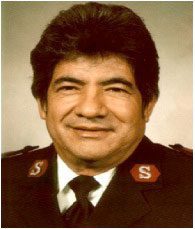Helping the U.S. Supreme Court
by Robert Docter –
There’s a family crisis in Elk Grove, California.
The Elk Grove School District, up by Sacramento, has been taken to court because it, like every other school district, requires children to recite the Pledge of Allegiance with the phrase “under God” in it. There’s a father up there who, besides being a physician and a lawyer, is also an atheist. He believes that requiring his daughter to say “under God” when she recites the Pledge of Allegiance to the flag violates his daughter’s rights under the First Amendment to the U.S. Constitution. He sued the district.
The case has moved through all the lower courts right up to the Federal Ninth Circuit Court of Appeals. This court happened to agree with him and declared the requirement did in fact violate her rights, and was, therefore, unconstitutional.
Now, the girl’s mother, a ‘born-again Christian,’ no longer lives with the father and has the custody rights of the child. She wants the girl to say “under God.” Nobody has quoted the girl. Things must be very tense between all of them.
How did we ever get in this bind? It’s really all fairly recent.
As the world went to war in the early twentieth century, school districts all over the United States, at the beginning of every school day, began to require students to stand next to their chairs, place their hand over their heart and recite a pledge of allegiance to the flag of the United States—and to the country for which it stands.
It had been written by a Bostonian in 1892. During the Eisenhower years in 1954, as the nation recovered from the climate of fear during the McCarthy anti-Communist era and sought only peace and stability, the phrase “under God” was added to the pledge. It caused only a little ripple at the time and was unanimously approved by Congress.
Now, the case has reached the U.S. Supreme Court, and they have to decide whether or not including the phrase “under God” in the required pledge actually does violate the “establishment clause” of the First Amendment. They’ve protected this clause zealously in the past with all kinds of prohibitions that might link religion to the state. The First Amendment, you see, besides guaranteeing freedom of speech, forbids the Congress from passing any laws pertaining to the establishment of a religion.
Only eight of the justices will hear the case. Antonin Scalia, reputed to be the most conservative justice, has recused himself from the case because he had already made his judgment clear in an earlier speech. Eight is an even number, and this Court seems often narrowly divided. If it comes down to a 4-4 split, the decision of the Ninth Circuit will stand. The Supreme Court needs your help. What do you think legally—not emotionally—but constitutionally? Write me. I’ll announce the results.
What should they do? They could probably duck the responsibility because the father who brought the case doesn’t have custody of the plaintiff in the case, but they don’t seem to be moving in that direction. They could have refused to accept the case in the first place, but they love to overturn the Ninth Circuit. Maybe they’ll say the pledge simply echoes the nation’s foundation documents and is, therefore, justified as “civil religion.” I guess that’s not real religion.
I suppose they could take a survey of opinion from the population. If they did, they’d find that 90% of the people don’t mind having the words there. But they can’t do that. The role of the U.S. Supreme Court is not to take opinion surveys; it’s to administer justice.
Maybe, they’ll ask themselves what those words actually contribute to the pledge. After all, saying something is true doesn’t necessarily mean it is true. And not saying it doesn’t mean it isn’t true.
Seems to me Jesus had some comments about this while talking with the Pharisees one day. He said: These people honor me with their lips, but their hearts are far from me. They worship me in vain; their teachings are but rules taught by men. (Matt. 15:8-9)
If you wish to honor God, it’s not what you say in life, but how you act out the nature of your character.
I suspect many citizens simply see this issue as “no big deal,” and they recite the words because they are there—kind of a “ceremonial deism”—a vague reference to an even more vague deity that neither inspires them nor causes them to love their neighbors any more.
If those words are encouraging that kind of a trivial relationship with God, maybe the Court should delete them from the pledge on spiritual grounds.
This illustrates my wrestling with this question—what do you think?












